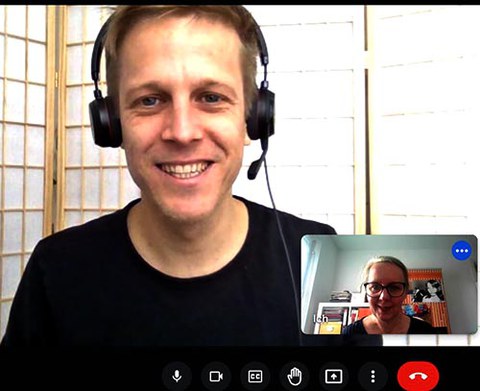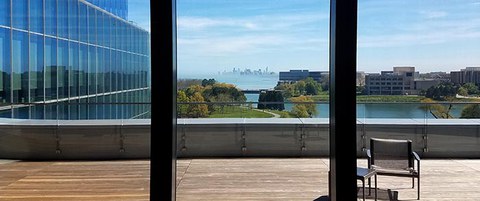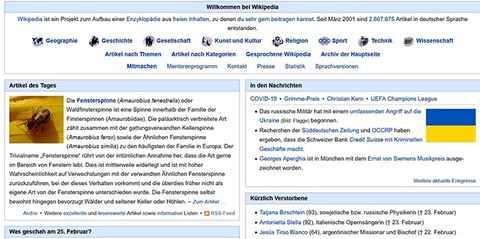A global vision: knowledge for all
(Profile from 2022)
Dagmar Möbius
Dr. Martin Gerlach is a physicist. When he decided to study at TUD, he doubted – despite all evidence to the contrary – that he was capable enough. All he knew was that physics would let him work in many different fields. Ten years later, he had completed his doctorate (summa cum laude) on the application of physical and mathematical models to sociodynamic phenomena. In his current role with the American Wikimedia Foundation, the 37-year-old is helping to close knowledge gaps around the world – working remotely from his home in Berlin.

Martin Gerlach speaks with the author.
Martin Gerlach was born in Dresden, where he attended Martin-Andersen-Nexö-Gymnasium, a high school specializing in math and science. Before graduating, he also spent a year at Oak Park High School in California. In 2004, he worked at Dresden University Hospital as his civilian service, an alternative to military service. A year later, he started a degree in physics at TU Dresden. “I was undecided and had been weighing up different fields of study,” he tells us. He was fascinated by fundamental questions – about quantum physics, for example. “I was up for it, but I wasn't sure I was smart enough. I just knew that a degree in physics would allow me to work in many other professions as well,” he says, recalling that time with a smile. What was more, “TUD ranked well for physics, and a spot at TUD meant I could study in my hometown.”
An introduction to programming
In his degree in Theoretical Physics with a minor in Mathematics, Marin Gerlach learned to apply various mathematical methods, such as statistics and differential equations, to describe real-world phenomena. “A key moment for me was a course with Professor Roland Ketzmerick on computer-aided modeling using simulation,” he explains. “That’s what got me into programming. Up to then, it had been a completely foreign field to me, but it is now an integral part of my work. Computer simulations are an easy way to pose questions and take an exploratory approach to problem-solving. Applying mathematical models to social phenomena is much more complicated than atoms.” After six years, including a period at Lund University in Sweden, he earned his Diplom degree, graduating with distinction.
Fascinated by research on language models
In 2012, Martin Gerlach moved to the Max Planck Institute for the Physics of Complex Systems in Dresden as a PhD student, joining Eduardo Altmann’s “Dynamic systems and social dynamics” research group. “The application of mathematical and physical models to sociodynamic phenomena such as language change was something I found fascinating, and indeed it has intrigued me ever since,” he says. He had never heard of it in his previous studies. Gerlach completed his doctorate at the School of Science and in 2016, he was awarded summa cum laude after defending his thesis titled “Universality and variability in the statistics of data with fat-tailed distributions: the case of word frequencies in natural languages.” He used data from millions of digitized books to analyze how words had changed over the previous 500 years. “We were able to quantify theories. Language as human interaction can be turned into models.” He continued his research into complex social systems for three years at Northwestern University in Evanston, outside Chicago. His impression? “This type of interdisciplinary research is more widespread in the US.”

Dr. Martin Gerlach conducted research at Northwestern University for three years. The view from campus over the lakeside promenade along Lake Michigan features the Chicago skyline in the background.
The only TUD alumnus in the company
Dr. Martin Gerlach returned to Germany in 2019. Since then, he has worked from his home in Berlin as a research associate for the San Francisco-based Wikimedia Foundation – not to be confused with Wikimedia Deutschland. “Long before the Covid-19 pandemic, the nonprofit had a global vision that everyone should share in knowledge. This is also reflected in the workforce,” he adds. Although the organization is headquartered in San Francisco, more than half of the ca. 500 employees work remotely from other parts of the world, including Germany. To Gerlach’s knowledge, he is the only TUD alumnus. “I was able to choose where I wanted to work from. At first, I was worried about whether I could do the job from home and whether I might get bored,” he admits. But he was willing to give it a try. In the US, Martin Gerlach had to commute an hour and a half to work every day. “I don’t miss that,” he laughs. He doesn’t feel alone in his home office. “We meet in both small and large groups, at meetings and conferences. The processes are well-organized.”
A new experience of diversity
People from North America, South America, Europe, and Asia work together in Gerlach’s eight-person group. “I’ve never worked in such a diverse team before. I’m learning a lot and I find it both exciting and rewarding,” he tells us. “I have experienced diversity in whole a new way. And that is essential if we are live up to our commitment to knowledge equity,” he firmly believes. Flexible working allows for a good balance with family responsibilities such as childcare. There is a structure and there are weekly tasks. “In the morning, I can usually concentrate on projects; meetings are held in the afternoon or toward evening because of the time difference.” Every day, the team members briefly discuss both technical and organizational matters. Much of the team’s work is asynchronous. Results and findings are documented in writing. Transparency is key: “Everything can be viewed; each of us can see what the others are working on.”
Closing knowledge gaps
Dr. Martin Gerlach works to close knowledge gaps and increase the quality of available knowledge. This includes establishing what knowledge is not yet available on Wikipedia, how much information is missing, and what methods can be used to fill in the gaps. To find those gaps, he looks at how readers use the available knowledge and how they navigate it, for example. “Are they finding what they are looking for? How can we better understand their needs and how can we make the knowledge easier to use?” These are key questions he explores. The physicist’s experience with models comes in handy here. “For example, we build tools for editors who can and want to contribute knowledge,” he explains. “We know that the complex system of rules is a huge barrier to getting involved. We help beginners to overcome those barriers, and are developing various modules that should make learning to edit easier.” The focus is also on countries where most people access the Internet from cell phones. In short, “we teach people how editing works.” This makes it possible to attract more volunteer writers, the content becomes more diverse, and the knowledge more relevant.

The German Wikipedia home page on the day the interview took place, featuring the article of the day on lace-webbed spiders and news of the attack against Ukraine.
Nowhere near finished, but headed in the right direction
“Men are responsible for 79 percent of page views for the German-language Wikipedia. We are very far from parity,” says Dr. Martin Gerlach. Not everything can be measured, he tells us, but the Wikimedia experts would like to correct disparities in geographic concentration and language versions, and address a lack of images. “Multimedia components are important to learning,” he argues, adding that he “could go on about this for hours.”
The Wikimedia Foundation never interferes with content. “Except in the case of legal requirements, for example following legal rulings, but those are the absolute exceptions.” Instead, the aim is to support authors. “We know that less than 20 percent of existing biography articles are about women, and we also want to increase the proportion of female readers and authors.”
That is why they run regular editathons – campaigns that encourage interested members of the public to get involved. Dr. Martin Gerlach co-authored a paper published in 2021 entitled “A taxonomy of knowledge gaps.” “We’re nowhere near finished, but we’re headed in the right direction,” he says. On the third Wednesday of every month, anyone interested in what researchers at the non-profit, donation-funded Wikimedia Foundation are currently working on can watch the live stream on YouTube.
Contact:
Dr. Martin Gerlach
Wikimedia Foundation
Email
Website 1
Website 2
